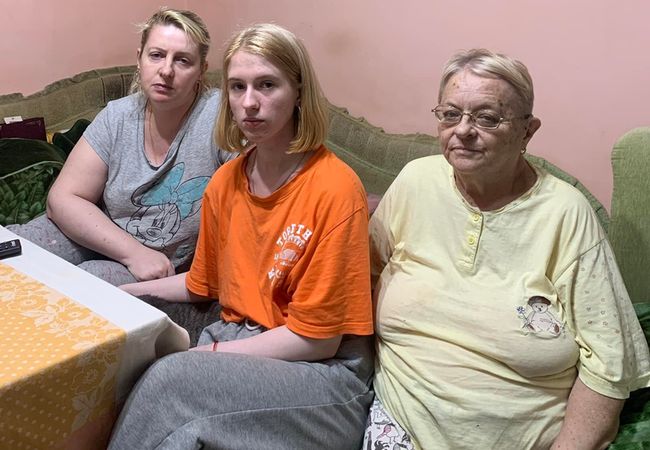
"Thoughts about what will happen to them when I'm gone have poisoned my life," says Evgenia Gogol, a mother of twins with mental disorders and the founder of a Facebook group for parents of children with autism. When the Great War began, the family lived in Kyiv and did not plan to leave. One day, a Russian rocket hit the specialized school where Anton and Maksym were supposed to go next school year.
"The future of the children has the greatest influence on all my decisions," says Evgenia. That is why in the spring of 2022 the family left for Italy, where they settled in a small village in the mountains on a farm. The children go to a local school with advanced inclusion, Evgenia is happy that her sons are doing well. Whether they will return to Ukraine after the end of the war will depend on what future awaits the boys here. And such a decision will be made by more than one family.
"Everything seems to be good in Ukraine when it comes to children, but no one gives an answer as to what to do when they grow up. I always secretly dreamed that one day the houses of supported living would become a reality in our country, because I heard many stories about what happens in psycho-neurological institutions, and it made me want to sob. Psycho-neurological institutions are a branch of hell," says Yevgenia Gogol.
In Lviv, a house of supported accommodation for adults with mental disorders operates with the support of the "Emaus" community at the Ukrainian Catholic University, another one - for men - was founded by the Lviv community of Orionist fathers. And in March, the supported living facility opened and received its first residents, founded by the NGO "Mastershop of Dreams" with the support of the Mental Health for Ukraine program.
ZAXID.NET tells how the "Dream Workshop" house differs from others, why Ukraine needs a state program to create such houses and how their residents live.
Parents are not eternal
Anna Ivanicheva, the founder of the "Workshop", says that before the opening of the first building, the organization went for six long years. First, in 2017 - two years after the registration of the organization, a day care center for young people with mental disorders (autism, Down syndrome, developmental delay, etc.) was opened..

"Children go to kindergartens, schools, attend developmental classes. And as soon as school ends, they stay in four walls. Even if there are relatives and family friends, this is too narrow a circle of communication. It's cool when they have the opportunity to go somewhere and be busy," says Anna Ivanicheva.
"Dream Workshop" wanted to have a network of such day centers, because every year new young people graduate from school and find themselves in isolation. In such centers, employment is mainly focused on the youth acquiring self-care skills, socializing, and parents can devote the freed time to other things - even just lie down and think about something else.
"We are trying to make everyone more independent. It's cool when parents tell us that they don't have to make breakfast anymore because their son makes it himself. It took years, but it worked. Even if he just heats up food in the microwave," says Anna Ivanicheva.
The organization also thought about people with mental disorders who lose their families, because parents are not eternal, and if there is no other close person ready to take them under their care, a person ends up in a psycho-neurological institution.
"In a psycho-neurological institution, a person has nothing personal, there he loses his individuality. And the house of supported living is a model close to family conditions," says the founder of "Dream Workshop".
15 new lives
A large three-story house for seven boys and girls is located in the green area of Pogulyanka. Nearby - neighboring houses, a flower garden, a park, a shop. While Anna and the mentor of the house Lyudmila Annich are talking in the living room, in the kitchen the first residents - 34-year-old Mykola and Mykhailo - are preparing dinner with the help of an assistant. You can hear laughter and conversations.
"The boys spent almost their entire lives in psycho-neurological institutions. During the last year, they lived in a psychiatric hospital on Kulparkivska Street - their psycho-neurological institution was closed, and they were waiting for a place to become available in another," says Anna Ivanicheva.
Later, one more boy and one girl became residents of the house. Two more girls are due to join soon. And during the month, "Dream Workshop" will open another house - for eight residents.
Half of the residents are from the Lviv community, the rest are people from psycho-neurological institutions evacuated from the war zone. Currently, the organization rents the house in which they live. The Mental Health for Ukraine program helps with this.
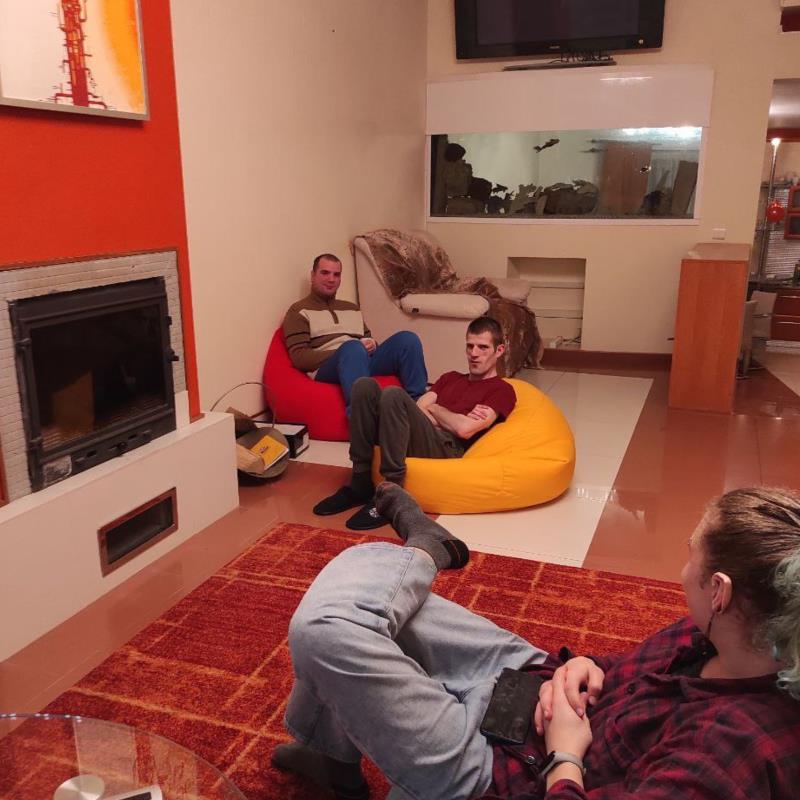
Evening in the living room of the house
Bought shoes for the first time in 30 years
You can hear the assistant in the kitchen telling Mykhailo how to cook buckwheat. He washes her under the tap and smiles.
"Life in an supported living facility is very different from what our residents had before. Everything is new for them. For example, the boys went to the store and bought shoes for the first time in over 30 years! Previously, they did not know their sizes, did not imagine what is comfortable, what they like or don't like, how it is when the seller is attentive to you. They finally have a choice," says Anna.
It was the same with the first trip in the tram, and with the first peeling potatoes and cooking salad, arranging one's own room. The assistants say that in the first days in the house, the boys were constantly apologizing and begging, asking permission even to make tea. Now they do it for themselves and offer it to others.
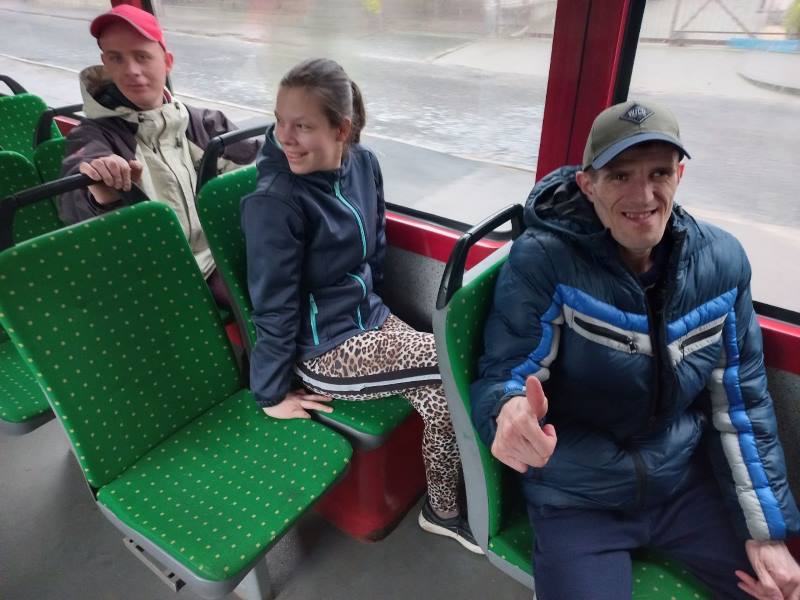
Vasyl, a resident of the building, fulfilled his dream of riding a tram
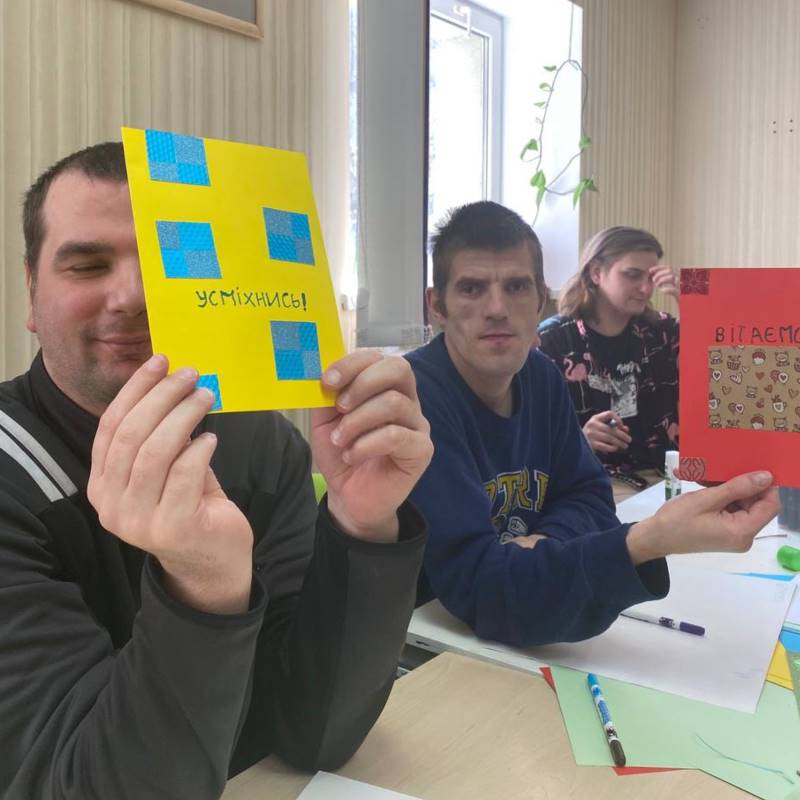
Residents of the house Mikhail and Nikolai in the classroom at the day care center
"It is impossible to describe the emotions experienced by the residents of this building - you just have to see it. They get used to the fact that this is their home, they are free here," adds Anna.
How the day passes in the house
The life of the residents of the house is completely normal from the point of view of a person who has not experienced mental disorders. They wake up, take a shower, prepare breakfast and eat together, go to a day care center (the Dream Workshop recently opened a second one), and do household chores. Only all this - with an assistant nearby. There are five assistants in the house - three of them live here, two - come.
"This is also the first time for us - to set up life so that everyone is comfortable, suits everyone, so that the assistants have days off, and the menu is made taking into account the tastes and health characteristics of everyone. We need to build a new system," says Anna Ivanicheva.
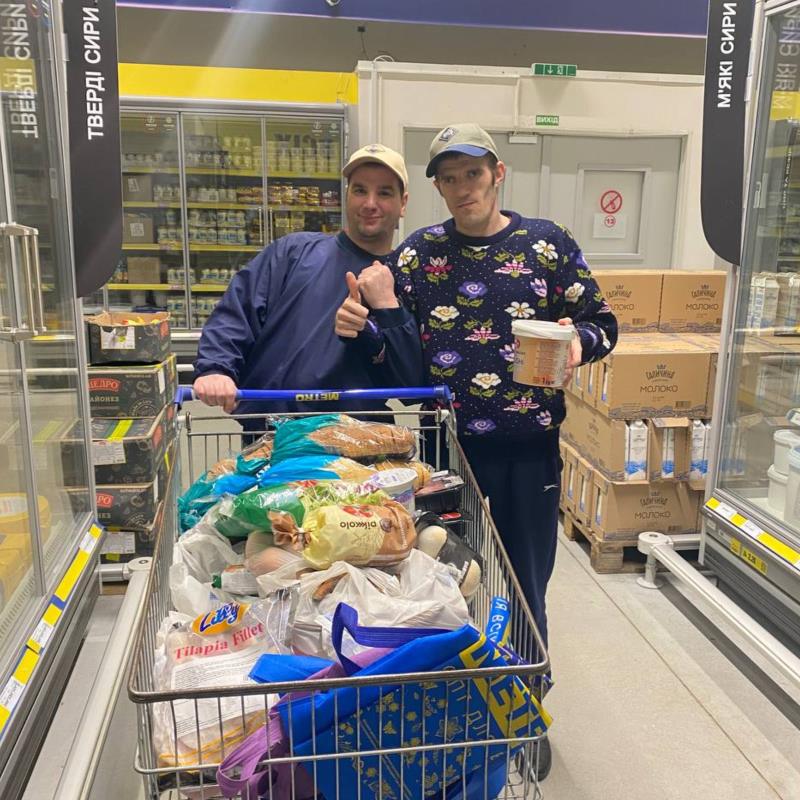
Mykhailo and Mykola buy products for the house
"We are building our system as a young family. It is a painstaking process, but there is no way without it, because it is not normal to live by someone else's rules," adds Lyudmila Annich, mentor of the house.
The first assistants, she adds, have a difficult role: they have to organize everything, take it into account, write it down and, if necessary, change it. And also - to continue to have a desire to work.
In addition to daily life and activities in the workshop, the residents of the house have a family doctor, go to the supermarket for shopping, walk in the park, play games, and receive guests. Only for them, most of this routine is happening for the first time.

Mykhailo tried horse riding
"A man from Germany came to us, and the boys learned that there is another language. They were shocked - what does this do to people, or are they crazy because they say something abnormal. We explained to them. And then they found out that there are many foreign languages, and that was another stress for them. Everything that we have in our everyday life and that we haven't thought about for a long time is new for them," adds Lyudmila Annich.
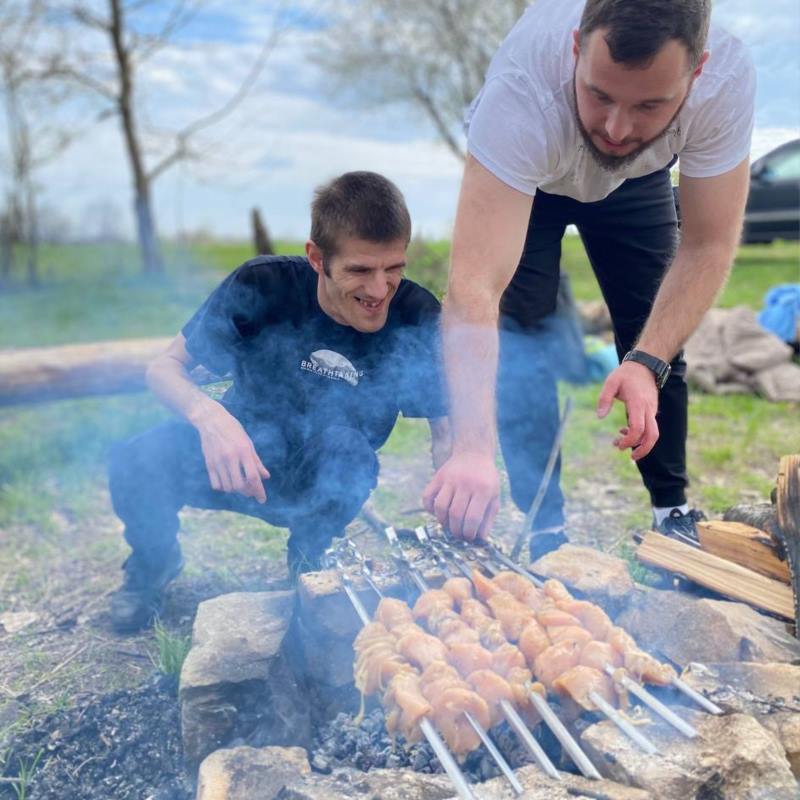
The first picnic in nature
Since this is the first house of supported living from the Dream Workshop, the organization has defined for itself the criteria for the selection of future residents. Residents are young people with mental disorders aged 18-40 who have basic self-care skills.
"People with mental disorders age faster, they need another program that we don't have yet. But everyone who lives here will have this family until the end," says Lyudmila Annich.
What is wrong with psycho-neurological institutions
Lyudmila Annich is the mother of Nastya's adult daughter, who has cerebral palsy. "So this is a very personal issue for me," she says. Lyudmila has been dealing with the issue of supported living since 2008. She recalls that when she came to officials 15 years ago and said that it was necessary to open houses of supported living, they did not understand her, she had to explain that such a phrase even exists and what it means. In response, I often heard: "if you have extra money, help psycho-neurological institutions."
"We visited many psycho-neurological institutions and realized that we absolutely do not want our children to end up there. In 2008, trips to psycho-neurological institutions were terrible - young people there were neglected and hungry. It was a disaster. Now the situation has changed somewhat, but still no one should live in large institutions. It hurts, it's abnormal," Lyudmila Annich says.
So parents of children with mental disorders began to unite, study legislation, world experience. Ludmila says that over the years few houses of supported living have appeared, but a lot has changed in people's minds. Now those who work in the social sphere understand the importance of the initiative and the fact that psycho-neurological institutions are bad, and although it is impossible to close them at the moment, they should not be filled at least.
"The more public organizations, communal institutions will work in the direction of houses of supported living, the better it will be. This is such an eight: we do - society sees that it is good - starts to help - we do even more, because we have more opportunities. I believe that the day will come when of supported living will become the norm, as they are all over the world. It's normal when an adult lives without mom and dad, has his own friends and his own interests," Lyudmila says.
Mykhailo and Mykola's parents had no chance
The first resident boys of the house are 34 years old. Their parents had no chance to give them a different life than in a psycho-neurological institution, says Lyudmila Annich.
"In those days, there was no other opinion in society, except that psycho-neurological institution is good. It was normal to give the child away, not to leave it. A mother who left a child in the family was bad because she did not think about the future. Now everything is radically different," she explains.
Elderly parents were "pressured" by everyone - polyclinics, schools, society constantly convinced them that their children were "not like that". Back in the early 2000s, Ludmila recalls, meetings of parents of children with mental disorders were full of complaints and tears, they were discouraged. Now the parents are motivated - yes, they cry, but at the same time they accept their lives, realize that they are not to blame and have the right to social services.
"Parents are the drivers of change. They have a huge responsibility: to complain that they are sick, that they need social services. This is also an eight: services have appeared - parents have become more active - motivation for new services. We have a lot: inclusion in the school, teacher's assistant, child's assistant. We are leaving," Lyudmila Annich says.
However, she adds, not everyone can endure, especially when there is no support. Sometimes the mother breaks down, and then the child ends up in a psycho-neurological institution. To prevent this from happening, it is necessary to implement a complete system without gaps, as it works for ordinary parents.
"When we give birth to children, we subconsciously know how it will be: kindergarten, school, higher education and independent life. Parents of children with mental disorders do not have this - they have a chasm," says Lyudmila Annich.
The support system for parents of children with mental disorders should start with early intervention, when they are accompanied, adjusted to life, help with specialized educational institutions or inclusion, and then with day care centers and supported living. Early intervention programs are working in Lviv, but there are not enough of them, Lyudmila Annich says, and queues are forming.
"Sometimes you have to wait three months, which is a lot of lost time, besides, the mother can send the child to a psycho-neurological institution during this time. Not because she is a bad mother, but because she is breaking down. It is necessary to work with parents so that they do not give their children away. The world has already recognized that psycho-neurological institutions are not profitable for the state, it is beneficial for them that their parents take care of their children, and the state would provide them with social services while they work. This is the norm,” she explains.
About openness
Good inclusion is when everyone feels good, says Lyudmila Annych.
“We will not put our house in the middle of someone's garden and say what we need, because we are poor and unhappy. We have to agree – after all, there should be a place for all people,” she explains.
So you need to go and get to know your neighbors, talk about yourself, show by a good example that people with mental disorders are not the ones who are scary in the neighborhood or who can be “infected”. It takes time, greater tolerance and a resource for explanations.
“When we rented this house, we had to pull out all our knowledge to convince the owner. He is beautiful, but he says: I thought that a family would live here, but I am worried about my property. But the owner saw that the house functions well, we take care of it and changed his mind. We are very open and always invite him and his family to visit us to show that it is needed, that it exists,” says the mentor at home.
“It's normal that people are afraid because they have stereotypes. You need to say a lot and be an example, then people change a lot,” adds Anna Ivanicheva.
What's next?
"Dream Workshop" plans to become a provider of social services that will be purchased by the state or the city, and is working with the authorities for this purpose.
"For me, respect for human rights and human dignity is important. This is the overall motive for the work of our organization. It is written in our documents that we are guided by the UN Convention on Human Rights, this is reflected in our values. We live in society: people are everywhere every day. We want everyone to have equal access to the opportunities that life offers," says Anna Ivanicheva.

Residents of the house and assistants on the porch of the house
The Need for Supported Living Homes
In 2020, the Lviv rehabilitation center "Zherelo" also started the construction of a house of supported accommodation for adults with disabilities who have lost parents or guardians. In 2021, $ 81264 were allocated for the reconstruction of the building (the winning project of the "Public Budget of Lviv"), but then the war got in the way. Now "Zherelo" is looking for benefactors who will help complete the reconstruction and furnishing of the house.
According to the head of "Jerela" Zoreslava Lyulchak, supported living services are needed not only by people with mental disorders, but also by people with other disabilities, elderly people who do not have families, and homeless people.
"Before the war, the need for this social service was great, and now it has become even greater - many people who need it were evacuated from the war zone. I think we have about 10,000 people in need of supported living services. Only 1,800 people receive the "Care at Home" service - they would be better suited to supported living," says Zoreslava Lyulchak.
It does not have to be a house - it can be a large apartment where, for example, six people can live. The maximum number of residents of an supported living facility is up to 20, as world practice shows.
"It is necessary to create conditions that are as close as possible to family conditions so that people can live in communities with dignity. Institutions should leave," says Zoreslava Lyulchak.
She adds that the Department of Social Policy of the has started work on the program for the development of social services in the Lviv community. In addition, the Lviv Regional Military Administration announced the acceptance of applications for financing the opening of houses of supported living in the communities of the region.



